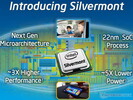Intel Atom Z3680

Der Intel Atom Z3680 ist ein sparsamer Dual-Core-SoC für Windows- und Android-Tablets. Er taktet mit bis zu 2,0 GHz und gehört der Bay Trail-T Plattform an. Dank eines speziell für Low-Power-Chips optimierten 22-Nanometer-Prozesses (P1271) mit Tri-Gate-Transistoren konnte die Performance sowie die Energieeffizienz gegenüber dem Vorgänger deutlich gesteigert werden.
Architektur
Die Prozessorkerne basieren auf der neuen Silvermont-Architektur, welche erstmals bei einem Atom-Prozessor als Out-of-order-Design ausgeführt wurde. Die dadurch erhöhte Auslastung der Pipeline sowie viele weitere Detailverbesserungen (optimierte Sprungvorhersage, vergrößerte Buffer, verbesserte Decoder) sollen die Pro-MHz-Leistung um etwa 50 Prozent steigern. Gleichzeitig entfällt allerdings das Hyper-Threading-Feature der Vorgängermodelle. Weitere wichtige Änderungen umfassen die Unterstützung neuer Befehlssatzerweiterungen wie SSE 4.1 und 4.2 sowie AES-NI (modellabhängig).
Performance
Dank der gesteigerten Pro-MHz-Leistung und einer Taktrate von bis zu 2,0 GHz übertrifft die Performance bisherige Atom-Modelle wie den Z2760. Vermutlich liegt der Z3680 damit in Reichweite preiswerter AMD-APUs wie dem A4-4355M (Spekulation), sodass ausreichende Leistungsreserven für die meisten Office- und Multimedia-Anwendungen bestehen. Anspruchsvollere Windows-Software dürfte den SoC allerdings schnell überfordern. Im Android-Bereich dürfte der Z3680 zum Performance-Segment zählen.
Grafik
Die HD Graphics (Bay Trail) basiert auf Intels-Gen7-Architektur, welche DirectX 11 unterstützt und auch bei den Grafiklösungen der Ivy-Bridge-Serie (z.B. HD Graphics 4000) zum Einsatz kommt. Mit nur 4 EUs und maximal 667 MHz Taktrate fällt die Leistung aber noch deutlich niedriger als bei der HD Graphics (Ivy Bridge) aus, sodass nur ältere und weniger anspruchsvolle Windows-Spiele flüssig dargestellt werden. Obwohl selbst dies ein drastischer Fortschritt gegenüber dem Vorgänger ist, reicht die GPU-Performance vermutlich nicht an konkurrierende AMD-APUs (mit höherer TDP) heran. Videobeschleunigung und die Ansteuerung von Displays mit bis zu 1.280 x 800 Pixeln bewältigt die GPU hingegen problemlos.
Leistungsaufnahme
Der gesamte SoC sollte eine SDP von höchstens 2 Watt besitzen, was einer TDP von unter 4 Watt entsprechen dürfte. Damit kann der Chip in passiv gekühlten Tablets eingesetzt werden.
| Codename | Bay Trail-T | ||||||||||||||||||||||||||||||||||||||||||||||||||||||||||||||||||||||||
| Serie | Intel Atom | ||||||||||||||||||||||||||||||||||||||||||||||||||||||||||||||||||||||||
Serie: Atom Bay Trail-T
| |||||||||||||||||||||||||||||||||||||||||||||||||||||||||||||||||||||||||
| Taktung | 1330 - 2000 MHz | ||||||||||||||||||||||||||||||||||||||||||||||||||||||||||||||||||||||||
| Level 1 Cache | 112 KB | ||||||||||||||||||||||||||||||||||||||||||||||||||||||||||||||||||||||||
| Level 2 Cache | 1 MB | ||||||||||||||||||||||||||||||||||||||||||||||||||||||||||||||||||||||||
| Anzahl von Kernen / Threads | 2 / 2 | ||||||||||||||||||||||||||||||||||||||||||||||||||||||||||||||||||||||||
| Stromverbrauch (TDP = Thermal Design Power) | 4 Watt | ||||||||||||||||||||||||||||||||||||||||||||||||||||||||||||||||||||||||
| Herstellungstechnologie | 22 nm | ||||||||||||||||||||||||||||||||||||||||||||||||||||||||||||||||||||||||
| Features | Intel HD Graphics (Bay Trail, max. 667 MHz), Intel 64, SSE 4.1, SSE 4.2, AES-NI, max. 1 GB Single-Channel LPDDR3-1067, Quick Sync | ||||||||||||||||||||||||||||||||||||||||||||||||||||||||||||||||||||||||
| GPU | Intel HD Graphics (Bay Trail) (311 - 667 MHz) | ||||||||||||||||||||||||||||||||||||||||||||||||||||||||||||||||||||||||
| 64 Bit | 64 Bit wird unterstützt | ||||||||||||||||||||||||||||||||||||||||||||||||||||||||||||||||||||||||
| Architecture | x86 | ||||||||||||||||||||||||||||||||||||||||||||||||||||||||||||||||||||||||
| Vorgestellt am | 11.09.2013 | ||||||||||||||||||||||||||||||||||||||||||||||||||||||||||||||||||||||||
Benchmarks
* Smaller numbers mean a higher performance
Noch keine Testberichte für diese CPU gefunden.


